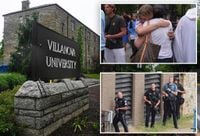On the evening of August 24, 2025, the University of South Carolina’s campus in Columbia was gripped by fear and confusion as reports of an active shooter near the Thomas Cooper Library prompted an immediate lockdown. Students received urgent alerts instructing them to shelter in place, barricade doors, and prepare for the worst. The incident, which unfolded just after 6:30 p.m. ET, sent shockwaves through a campus community already on edge from similar false alarms at other universities in recent days.
According to the university’s Carolina Alert system, the initial report described the suspect as a white male, approximately six feet tall, dressed in black pants, and still in the vicinity of the library. Law enforcement responded rapidly, with campus police and local authorities sweeping the building floor by floor. The scene was tense: sirens blared, multiple police cars raced to the area, and students scrambled for safety. Some hid behind refrigerators, while others anxiously texted friends and family to confirm their safety. "You don’t think this thing is going to happen to you, and then all of a sudden you’re hiding behind a fridge because there’s an active shooter a building away from you," one student recounted to WYFF News 4.
For nearly two hours, the campus remained in lockdown. The library, known to students as T Coop, was evacuated and closed as a precaution. The shelter-in-place order was not lifted until 8:00 p.m., when the university issued an urgent update: "ALL CLEAR. There is no ongoing emergency at this time. The Thomas Cooper Library building remains closed." Officials confirmed that no evidence of a shooter or gunfire was found. However, two students suffered minor injuries during the chaotic evacuation and were treated by emergency medical services, according to university spokesperson Jeff Stensland.
This harrowing episode at the University of South Carolina was not an isolated event. Just days earlier, on August 21, Villanova University in Pennsylvania and the University of Tennessee at Chattanooga faced their own false active shooter reports. At Villanova, a 911 call claimed there was a shooter in the law school building with at least one wounded victim. The campus went into lockdown, students received emergency texts, and law enforcement—including federal agents—descended on the scene in tactical gear. The university’s president, Rev. Peter Donohue, called the incident a "cruel hoax," and Pennsylvania Governor Josh Shapiro condemned the "swatting"—the act of making a fake emergency call to provoke a massive police response—as illegal. He pledged, "I’ve directed state police to work alongside their partners and use every tool at our disposal to find the person or people who called in this fake threat and hold them accountable."
Villanova was targeted again just three days later, when another false report directed police to Austin Hall, a student dormitory. Once again, authorities confirmed the call was baseless and gave the all clear after a thorough sweep. The back-to-back hoaxes sparked panic, forced lockdowns, and disrupted important campus events, including an outdoor Orientation Mass meant to welcome new students and their families. Videos posted to social media captured the chaos as attendees fled in fear, toppling chairs and scattering across the quad.
The University of Tennessee at Chattanooga also experienced a similar scare on August 21. An alert warned students of a possible active shooter in the University Center or Library, urging them to "Run. Hide. Fight." The lockdown was lifted only after multiple law enforcement agencies found no evidence of any threat. In each case, the threat was ultimately unfounded, but the emotional toll was undeniable.
These incidents are part of a troubling trend that has swept across American campuses in recent years. According to The Associated Press and multiple local reports, false active shooter alerts have become increasingly common, sowing panic and confusion among students, faculty, and families. Experts warn that the psychological fallout can be severe. Psychologists describe a phenomenon known as "alert fatigue," where repeated false alarms erode the sense of urgency and trust in campus safety protocols. Students report heightened anxiety, emotional exhaustion, and a lingering sense of unease even after the all clear is given.
The danger is not just emotional. As experts told various outlets, repeated false alarms can lead to a "boy who cried wolf" scenario, where students and staff may hesitate or fail to respond appropriately during a real emergency. This erosion of trust could have deadly consequences if a genuine threat were ever to materialize.
Universities now find themselves in a precarious position, balancing the need to act swiftly in the face of potential danger against the risk of fueling unnecessary panic. At the University of South Carolina, officials emphasized that the Carolina Alert was sent "out of an abundance of caution," and that law enforcement would continue to investigate the initial report. "There have been false gunfire reports at universities across the country in recent days and tonight's incident remains under investigation," the school said in a statement.
Administrators at affected schools are taking steps to address both the operational and psychological impacts of these incidents. Efforts include ramping up social media monitoring to detect and counter misinformation, investing in smarter alert systems that minimize false triggers, and expanding mental health resources for students shaken by repeated scares. Transparent communication and trauma-informed training are also being prioritized, with universities urged to educate students on how to respond under stress without succumbing to panic or apathy.
The stakes are high. As the fall semester begins and campuses across the country welcome new and returning students, the need for effective, trustworthy emergency protocols has never been greater. The recent scares at Villanova, the University of Tennessee at Chattanooga, and the University of South Carolina serve as a sobering reminder of the challenges universities face in an era of heightened anxiety and misinformation. Unless schools address the root causes of these false alarms and rebuild trust in their safety systems, the next alert could be the one students ignore—and that moment of hesitation could prove tragic.
For now, the Thomas Cooper Library at the University of South Carolina remains closed, and students are left to process the events of a night that, for a brief but terrifying time, felt all too real.






